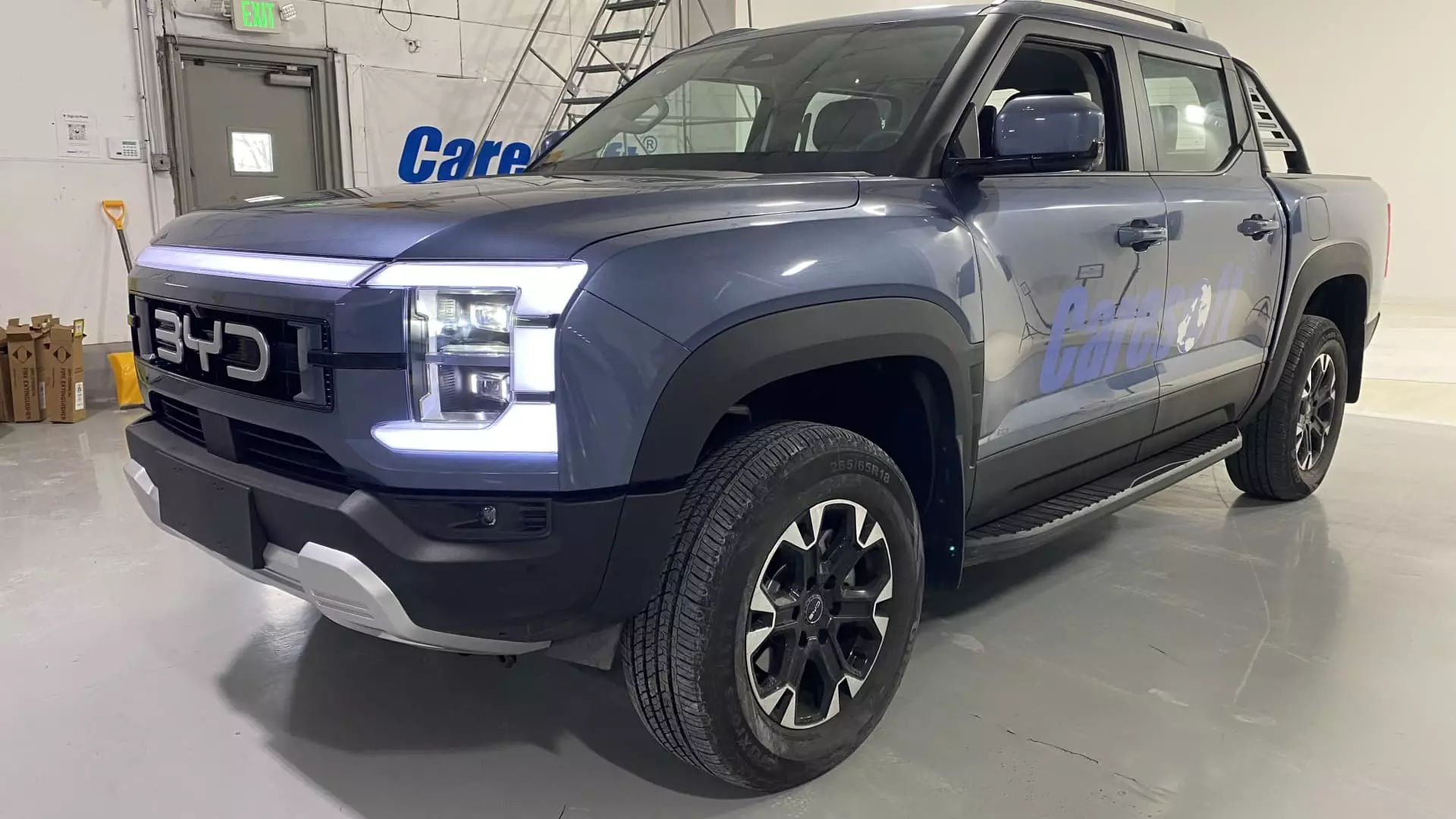The automotive industry is no stranger to competition, particularly in the pickup truck segment where American brands like Ford and Toyota have traditionally held sway. The sudden emergence of Chinese automaker BYD with its new truck model, the BYD Shark, raises significant questions about the future dynamics of this lucrative market. While details about its potential introduction in the U.S. remain uncertain, the Shark’s development illustrates how global automotive landscapes are rapidly evolving, prompting established manufacturers to reevaluate their strategies.
Upon first glance, the BYD Shark could easily be mistaken for an American pickup. Its design echoes that of popular American models, particularly resembling the Ford F-150 and the Explorer. This resemblance is no accident but a strategic choice to appeal to global markets, as pickup aesthetic trends often align across regions. BYD’s Shark blends familiarity with novelty, aiming to carve out its own identity while tapping into the nostalgia that comes with the classic pickup silhouette.
Currently, BYD has not made any commitments to sell the Shark in the U.S., but it has initiated a strong global strategy targeting markets where American makers dominate, such as Australia, Brazil, and Mexico. Understanding the critical role of pickups in these markets—especially their profit potential—others in the automotive space are closely watching BYD’s moves. A similar pressure was felt when BYD successfully launched its compact electric hatchback, the Seagull, at an aggressive price point.
The introduction of foreign competitors, specifically from China, prompts a reevaluation of the strategies prevalent among American automakers. The BYD Shark stands as a harbinger of change, emphasizing the shifting landscape where automakers must remain vigilant. From an analytical perspective, Terry Woychowski, an industry expert, emphasizes that the success of vehicles rests on how well manufacturers adapt to market demands and competitive pressures.
The stakes are high. Pickup trucks represent a substantial portion of revenue for American manufacturers, making it essential for brands like Ford and Toyota to assess how BYD’s aggressive pricing and product features may disrupt their established markets. For instance, BYD’s Shark, priced competitively in Mexico at about $44,000, presents a challenging option against established models from Ford and Toyota, which dominate the mid-size pickup sector.
Performance and Innovations
In terms of performance, the BYD Shark is engineered to appeal to consumers looking for efficiency without sacrificing capability. Its hybrid powertrain, which combines electric components with a 1.5-liter internal combustion engine, allows for flexibility in operation—allowing it to function as either a fully electric vehicle or a hybrid as needed. With a total range exceeding 500 miles, it presents a compelling alternative to existing models that dominate the U.S. market.
Recent reports suggest that consumer feedback on the Shark reflects a positive experience, despite some room for improvement in ride quality and handling. This is particularly notable given the competitive performance standards set by American and hybrid rivals. Nonetheless, the build quality and structural innovations, such as the protective wax-dipping of the frame for corrosion prevention—a practice employed by GM—signals careful attention to detail and a desire to learn from established best practices.
As BYD prepares to ramp up its presence in various global markets, it has already made substantial strides in increasing its exports. The reported figures—10,000 units shipped in 2024—underline a successful entry into competitive arenas. Analysts project rapid sales growth, tied to not only the Shark but also other vehicle offerings from BYD, underscoring the transformative nature of emerging auto markets.
This shift does not merely reflect logistical changes; it illustrates a comprehensive strategy where product diversification and rapid innovation play pivotal roles. As companies like BYD penetrate markets once deemed the forte of American manufacturers, the palpable sense of urgency for traditional automakers is evident. They must evolve quickly—balancing the nostalgia of their legacy with the demands of a more diverse consumer base looking for value and innovation.
The emergence of vehicles like the BYD Shark signifies not just the arrival of new competitors but a potential turning point in the automotive industry. With a focus on adaptability, efficient technology, and keen attention to market preference, we may witness an era where traditional boundaries between domestic and foreign automotive brands blur. The Shark exemplifies a new wave of global competition—one that American automakers must navigate with both caution and creativity.

